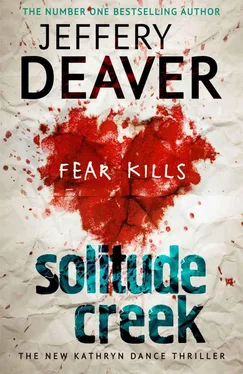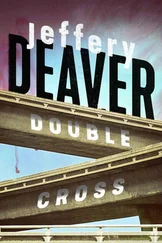The driver didn’t seem to care, though he was in significant pain. He wiped tears.
Lanners pulled his radio off his belt and made a call for the EMS bus. The dispatcher reported they’d have one there in ten minutes. Dance asked Lanners, ‘Can you go with him?’ She added, in a whisper, ‘It’s like there’s a price on his head.’
‘Sure,’ he said. ‘And we’ll give his family a call.’ The deputy, too, had spotted the wedding band.
Dance swiped at her own injury.
Kit asked, ‘You all right, Kathryn?’
‘It’s...’
Then Dance’s eyes focused past the deputy to another sign on the wall. She pointed. ‘Is that true?’
Henderson squinted and followed her gaze. ‘That? Yeah. Saved us a lot of money over the years.’
‘All the trucks?’
‘Every single one.’
Kathryn Dance smiled.
The man Ray Henderson was going to sell out, the man the crowd ten minutes ago was ready to lynch, was innocent.
It took only five minutes to learn that Billy Culp was not responsible for the tragedy at Solitude Creek.
The sign Dance’d seen on the wall of Henderson Jobbing, not far from where the driver sat, miserable in his heart and hurting in his jaw, read:
WE know you Drive safely.
Remember: Our GPS does too!
Obey the posted speed limits.
All the Henderson Jobbing trucks, it seems, were equipped with sat nav, not only to give the drivers directions but to tell the boss exactly where they were and how fast they’d been going. (Henderson explained that this was to protect them in the case of hijacking or theft; Dance suspected he was also tired of paying speeding tickets or shelling out more than he needed to for diesel fuel.)
Dance got permission from Bob Holly and the county deputies to extract the GPS device from Billy’s truck and take it into the Henderson office. Once it was hooked up via a USB cord, she and the deputies looked over the data.
At 8:10 last night the GPS unit came to life. It registered movement northward — toward the roadhouse — of about one hundred feet, then it stopped and shut off.
‘So,’ Kit Sanchez said, ‘somebody drove it into position intentionally.’
Yep,’ Dance said. ‘Somebody broke into the drop-box. Got the key. Drove the truck into position to block the club doors, shut the engine off and returned the key.’
‘I was home then!’ Billy said. ‘When it happened, eight o’clock, I was home. I’ve got witnesses!’
Henderson and his perhaps-nephew diligently avoided looking at either Dance or Billy, now knowing that the man they had wanted to throw under the... well, truck was innocent.
‘Security cameras?’ Dance asked.
‘In the warehouse. Nothing outside.’
Too bad, that.
‘And the key to the truck?’ she asked.
‘I’ve got it.’ He reached for a drawer.
‘No, don’t touch it,’ Dance said.
Fingerprints. Forensics didn’t much interest Kathryn Dance but you had to treat physical evidence with consummate reverence.
‘Shit. I’ve already picked it up.’
John Lanners, the MCSO deputy: ‘There’ll be plenty of prints on it, I’d imagine, but we’ll sort it out. Take yours for samples. Find the ones that don’t match Billy’s or the other drivers’.’
In gloved hands, Kit Sanchez collected the key fob from the offending truck and put it in an evidence bag. Dance knew in her heart, however, that there was no way there would be any prints from the man who’d intentionally blocked the club’s doors. She knew instinctively he would be meticulous.
Ironically, just after Dance had been shifted from criminal mode to civil, the administrative matter she’d come here about, taxation and insurance certificates, had just turned into a crime. A felony. Murder. Perhaps even a terrorist attack.
She said to Sanchez and Lanners, ‘Can you declare this a homicide? I can’t.’ A wry smile. ‘That’s the long-story part. And secure the scene. The drop-box, the truck, the oil drum, the club. Better go for the parking lot too.’
‘Sure,’ Lanners said. ‘I’ll call Crime Scene. Secure everything.’
With a dribble of a siren, a county ambulance pulled up and parked in front of the office. Two techs, large white men, appeared in the doorway and nodded. They spotted Billy and walked over to him to assess damage and mobility.
‘Is it broke, my jaw?’ Billy asked.
One tech lifted off the icy and bloody towel. ‘Got to take X-rays first and then only a doctor can tell you after he looks over the film. But, yah, it’s broke. Totally fucking broke. You can walk?’
‘I’ll walk. Is anybody out there?’
‘How do you mean?’
Dance glanced out of the window. ‘It’s clear.’
The four of them stepped outside and helped the scrawny driver into the ambulance. He reached out and took Dance’s hand in both of his. His eyes were moist and not, Dance believed, from the pain. ‘You saved my life, Agent Dance. More ways than just one. God bless you.’ Then he frowned. ‘But you be careful. Those people, those animals, they wanted to kill you just as much as me. And you didn’t do a lick wrong.’
‘Feel better, Billy.’
Dance found her shield, dusted it off and slipped it into her pocket. She then returned to the roadhouse. She’d tell Bob Holly what she’d discovered but keep the news from Charles Overby until she’d done some more canvassing.
She needed as much ammunition as she could garner.
As she approached the gathered press and spectators, she glanced toward a pretty woman TV reporter, in a precise suit, interviewing a Monterey County firefighter, a solid, sunburned man with a tight crew-cut and massive arms. She’d seen him at several other fire and mass-disaster scenes over the past year or so.
The reporter said to the camera, ‘I’m talking here with Brad C. Dannon, a Monterey County fireman. Brad, you were the first on the scene last night at Solitude Creek?’
‘Just happened I wasn’t too far away when we got the call, that’s right.’
‘So you saw a scene of panic? Could you describe it?’
‘Panic, yeah. Everybody. Trying to get out, just throwing themselves against the door, like animals. I’ve been a firefighter for five years and I’ve never...’
‘... seen anything like this.’
‘Five years, really, Brad? Now tell me, it looks like the doors, the fire doors, were unlocked but they were all blocked by a truck that had parked there. A tractor-trailer. We can see... there.’
Antioch March lifted his eyes from his present gaze — the pillowcase of fine-weave cotton, six inches from his face — and glanced at the TV screen, across the bedroom in the sumptuous Cedar Hills Inn in Pebble Beach. The camera from the crew outside the Solitude Creek roadhouse panned to Henderson Jobbing and Warehouse, which was all of ten miles from where March now lay.
A mouth beside his ear: ‘Yes, yes!’ A moist whisper.
On TV, the anchor, blonde as toffee, came back into high-definition view. ‘Brad, a number of victims and relatives of victims are accusing the driver of the truck of negligently blocking the doors, accusing him of parking there to go to the bathroom, or maybe even sneaking in to see the show last night. Do you think that’s a possibility?’
‘It’s too early to speculate,’ the firefighter replied.
It’s never wise to speculate, March corrected Brad, early or late. The bodybuilding firefighter, not quite as buff as March, looked smug. Wouldn’t trust him to rescue me from a smoke-filled building.
Much less a stampede in a roadhouse. Brad did, however, go on to offer graphic descriptions of the ‘horror’ last night. They were quite accurate. Helped by Brad and the images he was describing, March turned his attention back to the task at hand, lowered his head back to the pillow and pulsed away.
Читать дальше












